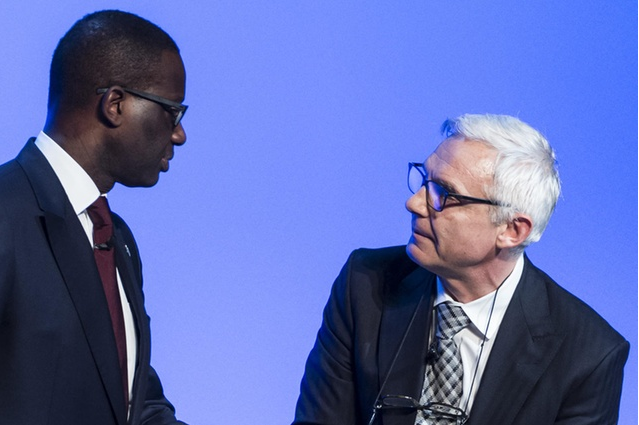Credit Suisse CEO Tidjane Thiam and chairman Urs Rohner (Keystone) When Tidjane Thiam arrived at the helm of Credit Suisse in the summer of 2015, he was a hero. Plucked from the same role at UK insurer Prudential, where he had doubled the share price in six years, he had big plans to shrink the Swiss group’s investment bank, slash costs, raise fresh capital and expand in Asia. He was one of four high-flying financiers parachuted in to run four of Europe’s biggest banks over a period of seven months in 2015 — alongside Bill Winters, who joined Standard Chartered; Jes Staley, who took over at Barclays; and John Cryan, who became Deutsche Bank chief executive. Four-and-a-bit years on, and with some bumps along the way, Thiam’s strategy has been implemented. Yet the
Topics:
Swissinfo considers the following as important: 3.) Swiss Info, 3) Swiss Markets and News, Business, Featured, newsletter
This could be interesting, too:
Nachrichten Ticker - www.finanzen.ch writes Die Performance der Kryptowährungen in KW 9: Das hat sich bei Bitcoin, Ether & Co. getan
Nachrichten Ticker - www.finanzen.ch writes Wer verbirgt sich hinter der Ethereum-Technologie?
Martin Hartmann writes Eine Analyse nach den Lehren von Milton Friedman
Marc Chandler writes March 2025 Monthly

Credit Suisse CEO Tidjane Thiam and chairman Urs Rohner (Keystone)
When Tidjane Thiam arrived at the helm of Credit Suisse in the summer of 2015, he was a hero. Plucked from the same role at UK insurer Prudential, where he had doubled the share price in six years, he had big plans to shrink the Swiss group’s investment bank, slash costs, raise fresh capital and expand in Asia.
He was one of four high-flying financiers parachuted in to run four of Europe’s biggest banks over a period of seven months in 2015 — alongside Bill Winters, who joined Standard Chartered; Jes Staley, who took over at Barclays; and John Cryan, who became Deutsche Bank chief executive.
Four-and-a-bit years on, and with some bumps along the way, Thiam’s strategy has been implemented. Yet the CS share price has halved. Other than the performance of Deutsche, from which Cryan was ejected last year, that is the worst record of “the class of 2015”. Now his reputation has been further hurt by a bizarre tale of personal intrigue. Can he survive?
Thiam’s clash with Iqbal Khan, who has left CS for crosstown rival, UBS, peaked last month when Khan was tailed by CS-appointed private detectives, suspicious he was plotting to hire former colleagues. A one-time close relationship had degenerated after the men, who lived next door to each other in Zurich, clashed over the disruption caused by Khan’s building work and his reported keenness to be anointed as Thiam’s successor.
The affair had the hallmarks of a hapless soap opera, but darkened when the security contractor who had employed the detective committed suicide. Trying to draw a line under the episode, CS fired the head of security and Pierre-Olivier Bouée, Thiam’s career-long right-hand man.
The Swiss media has followed every twist of the saga with Schadenfreude, culminating in a damning editorial in dominant local newspaper Neue Zürcher Zeitung (NZZ) last weekend, which accused Thiam of bringing the Swiss financial sector into disrepute.
Share price decline
When Thiam’s American predecessor Brady Dougan was ousted, it followed a fallout with the Swiss media over a CHF70 million ($70.3 million) bonus, as well as unheeded pressure from the Swiss regulator to raise capital. That translated, via a Swiss-dominated board and some big Swiss shareholders, into Dougan’s exit.
But the Iqbal Khan affair has pitched the Swiss establishment against the foreigners. Thiam – a rare black foreigner in Swiss finance – heads a bank whose dominant shareholders these days (the state-backed Qatar Investment Authority, US fund Harris Associates, Saudi fund Olayan, Norway’s Norges and BlackRock) are also based overseas.
So far those investors have been supportive, despite the fact that the latest farce has compounded the share price decline. The stock is down 6% since the affair broke.
Board members – also now mainly non-Swiss – are convinced the media backlash is motivated in part by racist and xenophobic views. As long as there is no evidence to suggest Thiam’s involvement in the hiring of the private detectives – and an internal probe concluded there was none – they and top investors will remain supportive.
Sniping
There has been plenty of sniping from the sidelines, though. In an interview with the Sunday edition of the NZZ, former CS chief executive Oswald Grübel was damning, saying CS and Thiam looked “ridiculous” and “embarrassing”. One big question must be whether the reputational damage from the affair has any impact on business, particularly in CS’s home market.
Calling obliquely for Thiam to be ejected, Grübel said his own resignation as UBS boss amid the Kweku Adoboli rogue trading scandal showed “the CEO must take responsibility to save the reputation of the bank . . . It would make sense to install a Swiss national as CEO”.
It is notable that the Swiss national who chairs the bank, Urs Rohner, has largely escaped criticism. This, despite the fact that he was the person who oversaw the unusually short terms of departure for Khan, according to bank insiders. It was that expedited departure that in turn sparked concerns he might poach staff to take to UBS, prompting the hiring of the detectives.
Thiam and Rohner, who hired him as chief executive and has said a chairman has only one shot at appointing the right CEO, have so far been closely aligned. The pair seem likely to withstand the latest farrago, too. But the margin for error from here on looks pretty thin.
Copyright The Financial Times Limited 2019
Tags: Business,Featured,newsletter
